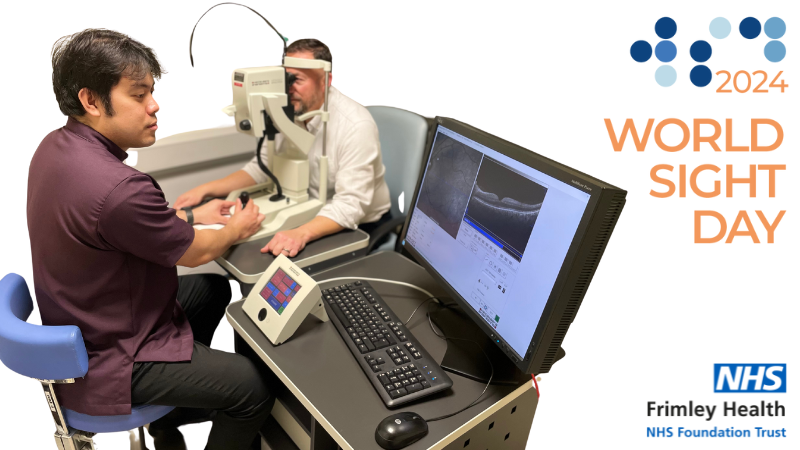
10 October 2024
It’s World Sight Day today (10 October), a global event that draws attention to blindness and vision impairment.
At Frimley Health, we are always trying to find new ways to help with people’s sight.
The Ophthalmology department have performed ground-breaking eye operations for corneal transplants this year, using an artificial cornea rather than a donated human one. There is a worldwide shortage of donated human corneas and up to a two-year waiting list for transplants in the UK.
“There is a delay in patients getting treatment because of the national shortage of available corneas. In selected cases, artificial corneas could be used giving patients quicker access to treatment and therefore improved sight,” said Frimley Health consultant ophthalmologist Tom Poole, who, along with consultant colleague Miss Hanbin Lee, has successfully performed the procedure on several patients.
“This is a very exciting step forwards in improving the vision of some of our patients with corneal disease who might otherwise face a long wait for a human cornea,” he added.
Another innovation has been using artificial intelligence technology to phone and assess cataract patients after their operation. Having the AI digital assistant handle the routine clinical conversation has freed up more than 500 hours of nursing time within the Trust’s eye department, allowing more resources for valuable face-to face clinics. Improving efficiency and the patient experience has seen the project shortlisted for two prestigious HSJ Awards.
In terms of research, a team from the Trust has been leading the way in a pioneering study hoping to find a breakthrough for treating thyroid eye disease (TED).
Symptoms of the debilitating disease include bulging eyes, redness, swelling and pain, and double or blurry vision.
“TED can affect your life in many adverse ways, from things as simple as watching TV or reading, to affecting your ability to work and to drive,” said Anuradha Jayaprakasam, consultant ophthalmologist. “In the most severe cases, it can lead to visual loss, if left untreated.”
She is the principal investigator for the LIDS trial being run at the Trust, studying the ability of oral drug linsitinib to tackle the disease. Since the trial began last year, Frimley Health has been one of the top two recruiting sites worldwide. Dr Jayaprakasam said she liked being able to offer a daily tablet option, rather than hospital attendances and more invasive procedures such as IV infusions.
Her experience in this field means she will be attending an international conference in Poland examining another possible treatment for TED, using a weekly injection of serum designed to reduce antibodies thought to trigger the disease. This will be the subject of a new research study at Frimley Park Hospital in the coming months.
“These drugs have the potential to impact on all aspects of the disease, including the appearance changes, and potentially prevent the disease advancing to the level of sight loss," she said. "It is a great motivation for me to be involved in work that could change the course of the disease for many of our patients.”

